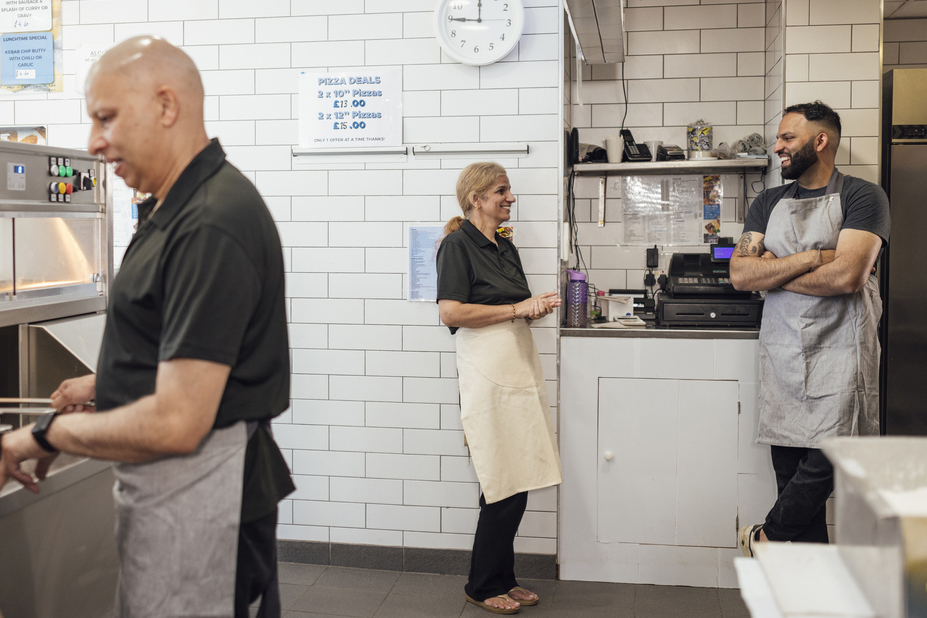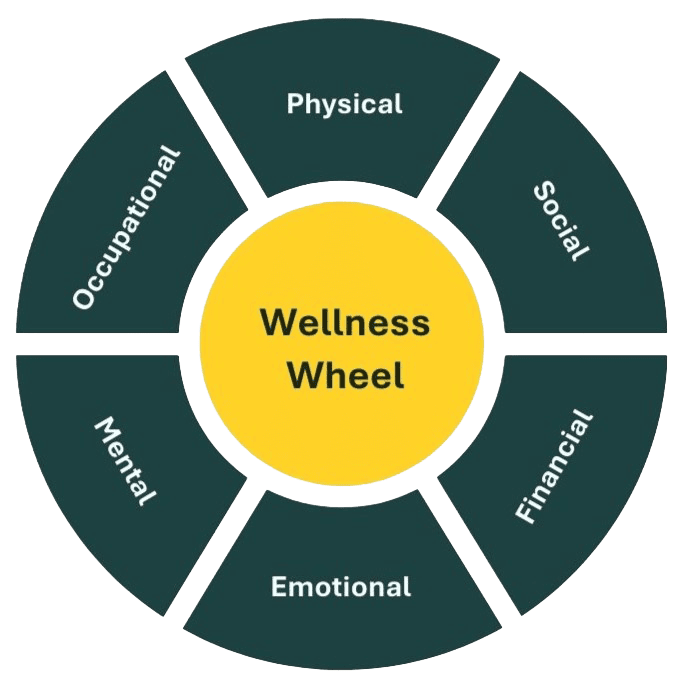Supporting Wellness Through Small Actions

Wellness isn’t all or nothing. It exists on a spectrum—just like mental health. One day, you might feel grounded, productive, and connected. Another day, you may feel emotionally drained or overwhelmed. This fluctuation is normal and expected.
The Mental Health Continuum helps us understand that mental health isn’t simply about the presence or absence of illness—it’s about where we are on a fluid scale ranging from healthy, to reacting, to injured, to ill. At any point on this continuum, small shifts in daily habits and support systems can make a difference.
The Wellness Wheel
The Wellness Wheel is a tool that helps you reflect on different areas of your life that influence your position on that continuum. It invites you to check in, notice what’s going well, and identify areas where you might need support. These areas of wellness will look different for everyone.
Each area of your life is deeply interconnected. A challenge in one area can ripple into others, just as improvements in one area can help strengthen the rest.
For example, poor sleep (physical) can lead to brain fog (mental), irritability (emotional), and social withdrawal (social). But the reverse is also true, improving your social connections can boost your emotional health, which can increase your motivation to engage in physical activity.
The goal isn’t perfection; it’s awareness, balance, and steady movement toward well-being.
Six Areas of Wellness
This article highlights six key areas, physical, mental, emotional, social, financial and occupational wellness, but wellness looks different for everyone. You may connect with other areas that are equally important, such as spiritual, cultural, creative, intellectual, or well-being. Feel free to personalize your wellness wheel to reflect on the areas of life that matter most to you.
Physical Wellness
Physical wellness is about caring for your body through movement, rest, nutrition, and preventative care. It’s the foundation of energy, resilience, and stamina. When your body is cared for, it becomes easier to manage stress, support focus, and regulate emotions. Neglecting this area can cause ripple effects in your emotional and mental well-being.
Actions to try:
- Take a daily walk or stretch break.
- Prioritize 7–9 hours of sleep with good sleep hygiene.
- Eat balanced meals with regular hydration.
- Keep up with medical and dental checkups.
Mental Wellness
Mental wellness involves your cognitive health—how well you’re able to focus, learn, manage stress, and maintain perspective. It’s what helps you stay grounded and adaptable during difficult situations. When you tend to your mental health, you’re better able to make sound decisions, solve problems, and support your emotional and social needs.
Actions to try:
- Practice mindfulness or guided meditation.
- Set screen time boundaries to protect your attention span.
- Stimulate your brain with books, puzzles, or creative tasks.
- Make time for mental rest at work—short breaks can make a significant difference.
Emotional Wellness
Emotional wellness means being in tune with your feelings, expressing them in healthy ways, and coping effectively with life’s ups and downs. When you acknowledge and work with your emotions instead of pushing them down, you can build stronger relationships, make clearer decisions, and feel more emotionally balanced.
Actions to try:
- Name your emotions in real time—try saying, “I feel overwhelmed right now.”
- Express your feelings through journaling, art, or movement.
- Talk to a trusted friend, mentor, or therapist when needed.
- Practice gratitude or self-compassion exercises.
Social Wellness
Social wellness reflects the strength and quality of your connections with others. Having meaningful relationships improves your sense of belonging and provides emotional buffers during tough times. When you’re socially nourished, it can improve your mood, self-worth, and even physical health.
Actions to try:
- Reach out to a friend or family member for a short check-in.
- Join a local group, club, or community initiative.
- Be honest about your capacity and communicate your needs clearly in relationships.
- Offer or ask for help—it’s a meaningful way to build trust and connection.
Financial Wellness
Financial wellness is about feeling stable and confident in managing your finances. While it doesn’t mean being wealthy, it does mean being informed, prepared, and in control. Financial stress can take a major toll on mental and emotional health, while financial clarity supports peace of mind and long-term planning.
Actions to try:
- Track your spending and set a simple monthly budget.
- Start a small savings plan—setting aside even a little each week adds up over time.
- Learn more about financial literacy from free resources or workshops.
- Avoid comparing your financial path to others—focus on what works for you.
Occupational Wellness
Occupational wellness is about finding fulfillment and satisfaction in one’s work and career, while also maintaining a healthy work-life balance. It involves continuous learning, professional growth, and managing workplace stress. It encompasses aligning work with personal values and utilizing skills and talents to contribute in a meaningful way.
Actions to try:
- Set boundaries to establish work-life balance.
- Build respectful relationships by offering support and connecting with your team.
- Expand or refresh your skills by seeking learning and development opportunities.
- Showcase your talents by identifying and using your strengths.
Wellness is not a destination but an ongoing relationship with yourself. By regularly checking in with each area of your Wellness Wheel, you can stay grounded, recognize early signs of imbalance, and take small, intentional steps toward alignment. Whether you’re thriving or just trying to get through the week, tending to your well-being helps you build resilience and stay connected to what matters most.
Download the Wellness Wheel: Self Check-in Guide to get started.
Don’t forget to visit our hub for more tools and resources as well as free courses to support your mental health at work.